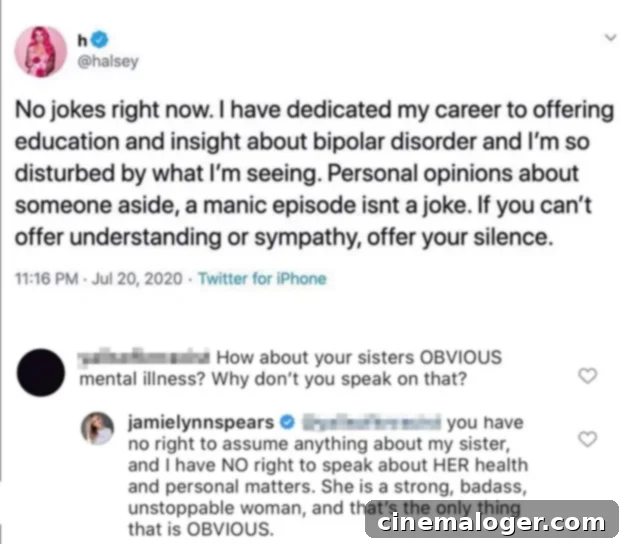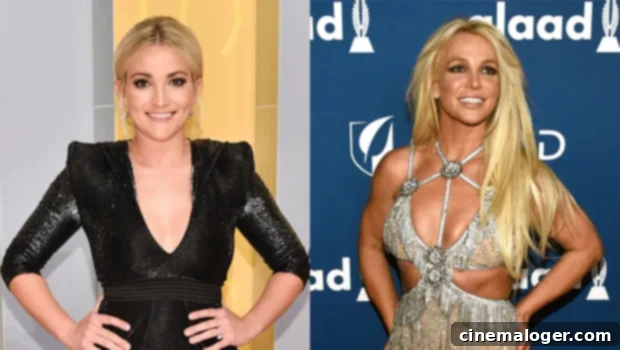Jamie Lynn Spears Advocates for Mental Health Privacy Amidst Britney Spears Conservatorship Discussions
In a significant social media exchange that brought critical conversations about mental health and celebrity privacy to the forefront, Jamie Lynn Spears, known for her roles in “Zoey 101” and “Sweet Magnolias,” recently found herself defending her stance on personal boundaries. What began as an uplifting message about understanding and empathy for those battling mental illness quickly escalated into a pointed discussion about her superstar sister, Britney Spears. The incident highlighted the intricate balance between public interest in celebrity lives and the fundamental right to privacy, especially concerning sensitive health matters.
Halsey’s Powerful Message and Jamie Lynn’s Amplification
The catalyst for Jamie Lynn’s Instagram post was a powerful tweet from multi-platinum singer Halsey. On July 20, Halsey, who has openly discussed her own experiences with bipolar disorder, shared a profound insight: “If you can’t offer understanding or sympathy, offer your silence.” This statement resonated deeply with Jamie Lynn, who subsequently shared it with her millions of followers. In her caption, the 29-year-old artist underscored the immense importance of respecting the privacy of individuals grappling with mental illness, emphasizing that public figures and their families are no exception to this vital need for discretion and compassion. Her initial message aimed to foster a supportive environment for those affected by mental health challenges, encouraging a culture of empathy rather than intrusive speculation.
Jamie Lynn’s thoughtful repost of Halsey’s tweet was a clear attempt to contribute positively to the ongoing dialogue surrounding mental health destigmatization. By sharing Halsey’s words, she aimed to encourage a more considerate approach from the public towards anyone facing such struggles, advocating for a space where privacy is paramount. This was particularly pertinent given her own family’s well-documented experiences under intense public scrutiny. Her caption was a heartfelt plea for understanding and a reminder that behind every public persona is a human being deserving of dignity and respect, especially during vulnerable times.
https://www.instagram.com/p/CC6H8DRAdb3/?utm_source=ig_web_copy_link
A Call for Privacy: Jamie Lynn’s Original Instagram Post
Jamie Lynn articulated her feelings eloquently in the caption accompanying Halsey’s tweet. “If you deal with mental illness or care for someone dealing with mental illness, then you know how important it is to respect the situation with privacy for the person, and the family trying to protect their loved ones, no matter how it may appear to the public, and as the public we must learn to do the same,” she began, setting a clear boundary and advocating for a more empathetic public discourse. Her words underscored the often-overlooked struggle faced by families endeavoring to protect their loved ones from the added pressures of public judgment and speculation during difficult times.
She continued, extending a message of solidarity and hope: “I pray this doesn’t bring shame to anyone dealing with mental illness, you are not alone, and you are loved. Sending all my love and prayers to all of you,” she added, concluding with a black heart emoji. The initial response to her post was overwhelmingly positive, with countless fans sharing their gratitude, love, and prayers, many of whom were battling mental health conditions themselves or supporting loved ones who were. Her message resonated with those who understood the profound importance of privacy and discreet support in the face of such personal challenges. It was a moment of connection and shared vulnerability, until a fan’s pointed question shifted the tone of the conversation.
The Fan’s Challenge and Jamie Lynn’s Fierce Defense

Despite the overwhelming positive feedback, one user chose to directly challenge Jamie Lynn’s message. The fan posted, “How about your sister’s OBVIOUS mental illness? Why don’t you speak on that?” This direct question, referring to Britney Spears, forced Jamie Lynn to address the public’s persistent curiosity about her older sister’s well-being. It was a stark example of the very lack of privacy and understanding that Jamie Lynn was advocating against, turning a message of support into a moment of public interrogation.
Jamie Lynn’s response was swift, unequivocal, and powerful. She fired back with a firm rebuke, stating, “You have no right to assume anything about my sister. And I have NO right to speak about HER health and personal matters. She’s a strong, badass, unstoppable woman, and that’s the only thing that is obvious.” Her words made it clear that while she supports general mental health advocacy, she maintains strict boundaries when it comes to her sister’s personal and medical information. This clap back not only defended Britney’s right to privacy but also underscored Jamie Lynn’s commitment to upholding the principles she had just articulated. It was a direct refusal to engage in public speculation or exploit her sister’s private struggles for public consumption, a stance that resonated with many who champion celebrity privacy.
Britney Spears’ Conservatorship: A Brief Overview
The fan’s pointed question and Jamie Lynn’s defense are deeply intertwined with the widely publicized conservatorship under which Britney Spears has lived for over a decade. The 38-year-old pop icon has been under the legal conservatorship of her father, Jamie Spears, 68, since 2008. This arrangement was initiated following a highly publicized mental health crisis and hospitalization that year. For many years, the details surrounding the conservatorship remained largely private, fueling speculation and concern among her dedicated fanbase.
The conservatorship grants her father, or subsequently appointed individuals, extensive control over Britney’s finances, legal affairs, medical decisions, and personal life, including her ability to travel and manage her daily activities. In April 2019, Britney again checked into a mental health facility, publicly stating she needed some “me-time.” This event further intensified public interest and reignited discussions about her autonomy and the necessity of the conservatorship.

The Ongoing Battle and the #FreeBritney Movement
Twelve years after its establishment, the conservatorship remained a contentious topic. While Jamie Spears initially managed it, he stepped down temporarily in September 2019 due to health reasons. Subsequently, Jodi Montgomery was temporarily appointed to oversee Britney’s health and personal affairs, a role she officially began in January 2020. This shift did not, however, quell the concerns of a significant portion of Britney’s fanbase.
The #FreeBritney movement, which gained substantial traction, particularly in mid-2020, represents a fervent plea from fans and advocates worldwide for Britney to regain control over her own life. This movement argues that the conservatorship, originally intended as a temporary measure during a crisis, has become an overly restrictive and unnecessary imposition on an adult woman capable of making her own decisions. Fans involved in the #FreeBritney campaign believe that Britney has been signaling her distress through subtle messages on social media and that she deserves the right to manage her finances, career, and personal choices independently.
The movement’s core demand is for greater transparency regarding the conservatorship proceedings and for Britney to be allowed to appoint her own legal representation. Advocates often cite perceived inconsistencies in her public persona versus her social media presence, and questions about her ability to communicate freely. The hashtag #FreeBritney trended heavily on Twitter on July 21, the day after Jamie Lynn’s online exchange, reflecting the intense public interest and the emotional investment of fans in Britney’s fight for autonomy. This groundswell of support often surrounds pivotal moments, such as court hearings.
The Upcoming Hearing and Britney’s Quest for Autonomy
A new hearing regarding Britney’s conservatorship status was scheduled for July 22, just one day after Jamie Lynn’s viral clap back. Such hearings are critical junctures where legal decisions are made concerning the extent and continuation of the conservatorship. At the time, Britney had limited to no control over her financial decisions, legal engagements, medical treatments, or personal movements, a situation that the #FreeBritney movement passionately sought to change. The hearing served as a focal point for the movement’s efforts, with fans hoping for a resolution that would grant Britney greater personal freedom.
The continued existence of the conservatorship, despite Britney’s active career and public appearances, has raised broader questions about the legal framework surrounding such arrangements, particularly for individuals in the public eye. The intersection of celebrity status, mental health, and legal guardianship creates a complex scenario, where the line between protection and control becomes increasingly blurred in the public perception. The pressure on family members like Jamie Lynn to navigate these discussions while respecting personal boundaries is immense.
Celebrity Privacy and Mental Health: A Broader Discussion
Jamie Lynn Spears’ experience serves as a microcosm of the larger debate surrounding celebrity privacy, mental health, and the public’s perceived right to information. While public figures often benefit from media attention, they also face unprecedented levels of scrutiny and an erosion of their personal boundaries. Mental health, in particular, is a deeply personal and often vulnerable aspect of an individual’s life. Jamie Lynn’s insistence on privacy, echoing Halsey’s sentiment, highlights a crucial point: empathy and understanding often begin with respectful silence, not intrusive questioning.
The incident underscores the ethical dilemma faced by both the media and the public: how to cover stories involving mental health responsibly without contributing to stigma or violating personal privacy. Jamie Lynn’s response was not just a defense of her sister but a powerful statement about the universal right to privacy, especially when navigating delicate health matters. It emphasized that even for global superstars, the fundamental human need for personal space and dignity remains paramount.
Conclusion: A Call for Empathy and Respect
Jamie Lynn Spears’ social media interaction encapsulates a pivotal moment in the ongoing public discourse about mental health awareness and celebrity privacy. Her initial post, inspired by Halsey’s compassionate words, aimed to foster understanding and respect for those dealing with mental illness. The subsequent fan interaction and Jamie Lynn’s firm response powerfully reiterated that while advocacy for mental health is vital, it must always be balanced with an unwavering commitment to individual privacy and personal boundaries.
The prolonged conservatorship of Britney Spears, coupled with the impassioned #FreeBritney movement, adds layers of complexity to this narrative, underscoring the intense public interest in her well-being. Jamie Lynn’s steadfast refusal to discuss her sister’s private health matters publicly serves as a compelling reminder that even amidst global fame, every individual, including those like Britney Spears, deserves the dignity of privacy and the right to navigate their personal challenges away from intrusive public speculation. Ultimately, the incident is a profound call for greater empathy, discretion, and respect in how society engages with mental health issues, particularly when they involve high-profile personalities.
